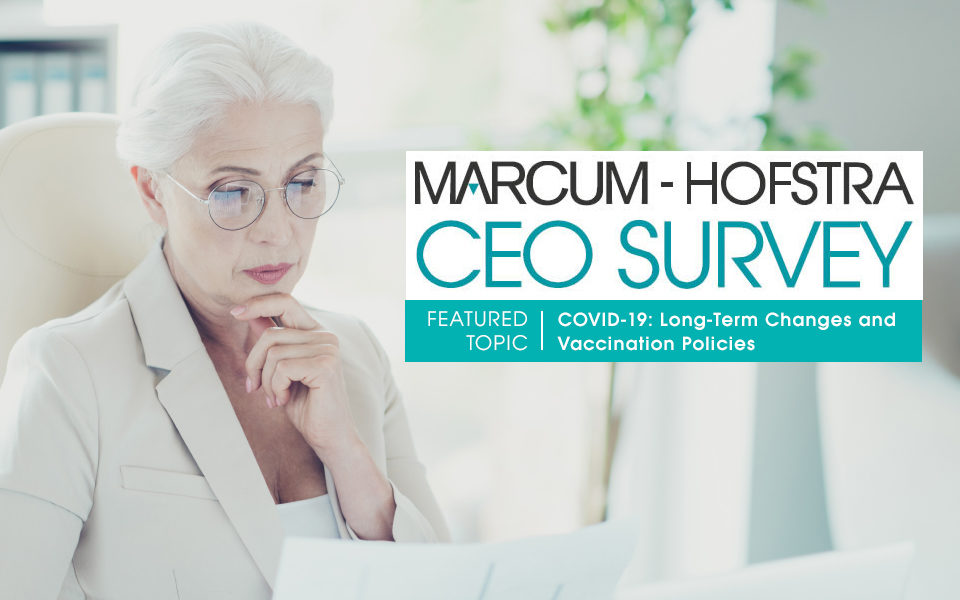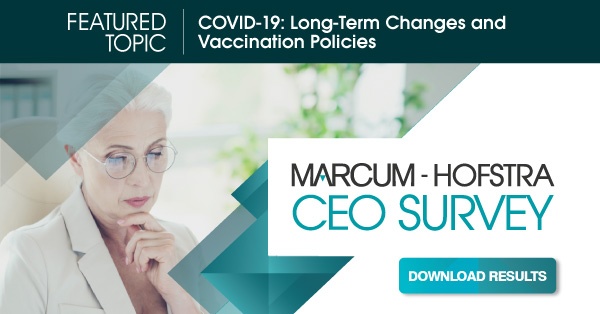Middle-Market CEOs See Remote Workforce as Permanent Change, Finds Marcum-Hofstra Survey
Most Will Require or Incentivize Employees to Get Vaccinated
More than 80 percent of middle-market CEOs say they are likely to allow for a partially remote workforce even after the COVID-19 pandemic is over, according to the latest CEO survey from Marcum LLP and Hofstra University’s Frank G. Zarb School of Business.
A permanent shift to a partially remote workforce was cited most often by CEOs when asked to predict long-term business changes as a result of the pandemic, with 82 percent of those surveyed saying they were likely or very likely to permit some employees to work from home.
“There is no doubt that workplace practices, policies and behaviors will be changing permanently in many ways, post-COVID,” said Janet Lenaghan, dean of the Zarb School of Business. “Mid-market CEOs clearly recognize that giving people flexibility is a smart business strategy that leads to greater productivity.”
Nearly half of CEOs (45%) also said they will require employees to be vaccinated against COVID-19 if it is legal to do so, and another 36% said they would offer incentives to employees to get the vaccine.
The survey polled the leaders of 251 companies with revenues ranging from $5 million to $1 billion plus.
Long-Term Business Changes
CEOs were asked what long-term changes, if any, they are considering as a result of their experiences during the COVID-19 crisis. Right behind allow more remote work, CEOs said they plan to revise their strategic plans to mitigate future risks exposed by the crisis (80%) and build resiliency against supply chain disruptions (77%).
Some of their responses included:
- “Allowing work from home on a permanent basis. No return to office.”
- “Certainly, going to factor pandemic-type scenarios into debt modeling and want access to an unused (revolving line of credit) going forward.”
- “Looking at ways to continue to reduce costs and enhance working capital (i.e., extending vendor payment terms).”
- “Reconfiguring workforce and increasing talent pool through remote work.”
- “Reduce real estate exposure and increase remote working environment.”
- “…The ability to permanently work remotely for anyone who wishes to… will save costs in the short and long term and will also improve productivity and employee engagement.”
Business Outlook
Since the last Marcum-Hofstra survey in February, CEOs’ overall business outlook improved substantially. Ten percent now rate their outlook as “very positive” (10 on a scale of 1-10), compared to 3.4% who were “very positive” two months ago. Sentiment also improved among more moderate respondents, with three-quarters of CEOs (75.3%) rating their outlook in the positive range (1-5), compared to less than half (48.3%) in the previous survey.
Consistent with the uptick in overall economic outlook, CEOs in most sectors of the economy were conservatively optimistic about the next 12 months. Wholesale/distribution companies were the most positive, with 100% of CEOs rating their outlook between 5-10. This was followed by technology/communications companies, with 82% on the positive side of the ratings scale, retailing (75%) and manufacturing (74%).
“The tide is beginning to turn as CEOs have embraced a disbursed workforce as a viable new operating model for the long-term and the availability of a COVID vaccine enables more plants and offices to begin reopening. We also saw that CEOs are incorporating lessons learned during the pandemic by revising their strategic plans to mitigate future risks exposed by the crisis as well as to withstand supply chain shocks. A large majority also told us they plan to negotiate more flexible terms with vendors and will be increasing their cash reserves against any future liquidity crisis,” said Jeffrey M. Weiner, Marcum’s chairman & chief executive officer.
“The entrepreneurial nature of the middle-market will be a significant asset as CEOs rethink how to position their businesses for the future. It will be very interesting to see how these measures play out in the months and years to come,” he said.
The Marcum-Hofstra CEO Survey is a periodic gauge of mid-market CEOs’ outlook and their priorities for the next 12 months. It is conducted as part of the Zarb School of Business MBA curriculum, and developed and analyzed by Hofstra MBA students led by Dr. Andrew Forman, associate professor of international business and marketing, in partnership with Marcum.
Said Dr. Forman: “Participation in the development and analysis of the CEO Survey provides Zarb students with an appreciation of the impact of rapidly changing world events on business priorities. In particular, the current survey demonstrates how companies learn from crises and build resiliency as they seek to reduce future vulnerability.”
Business Planning Influences
Economic concerns continued as CEOs’ primary influence for business planning over the next 12 months, with nearly one-third (32.3%) rating it their greatest influence and 61.8% citing it as one of their top three influences. Technology (37.8%), rising material and operational costs (36.7%), and availability of talent (35.4%) were the next most cited as top three influences on business planning.
$15 Minimum Wage
The survey also queried CEOs about the prospect of a federally mandated $15 per hour minimum wage. More than two-thirds (69%) said they are preparing for this possibility. Steps they say they are taking include:
- “More automation.”
- “More contract work.”
- “Offer incentives for staying fit and meeting certain healthcare goals to help absorb costs via healthcare.”
- “We will have to raise customer prices but enhance our rewards programs.”
- “Reduce budgeted labor hours per fiscal year.”
- “Reduce overhead expenditures and fringe benefits.”
- “Reinforce our digital capabilities and invest more in streamlining our business.”
- “Upskilling and infrastructure consolidation.”
- “We will have to lay people off and require employees to pay for more of their healthcare.”
- “We will work on cutting the costs with other least-used employee benefits and/or vendor expenditures.”
Slightly more than a quarter of respondents (27%) said they are not taking steps to prepare for the possibility of a higher minimum wage. Representative comments included these:
- “It won’t [a]ffect the overall business.”
- “Just all part of the cost of doing business.”
- “Most of our employees are salaried.”
- “Most of our hourly workforce has already achieved $15+ per hour.”
- “We already pay above the $15 minimum staff for 90% of our staff. We don’t consider this a hardship.”
About the Frank G. Zarb School of Business at Hofstra University
Hofstra University’s Frank G. Zarb School of Business prepares students to become tomorrow’s global leaders. Located just 25 miles from New York City, Zarb students have access to internships and networking opportunities across every industry. The Zarb School combines entrepreneurial, hands-on learning and research with real-world experience and mentorship in state-of-the-art facilities, including a Behavioral Research in Business Lab, Center for Entrepreneurship, and academic trading room. Our undergraduate and graduate programs in accounting, management and entrepreneurship, marketing and international business, finance, and business analytics are ranked and recognized by US News & World Report. For more information, visit www.hofstra.edu/zarb.
About Marcum LLP
Marcum LLP is a top-ranked national accounting and advisory firm dedicated to helping entrepreneurial, middle-market companies and high net worth individuals achieve their goals. Marcum’s industry-focused practices offer deep insight and specialized services to privately held and publicly registered companies, and nonprofit and social sector organizations. The Firm also provides a full complement of technology, wealth management, and executive search and staffing services. Headquartered in New York City, Marcum has offices in major business markets across the U.S. and select international locations. #AskMarcum.







